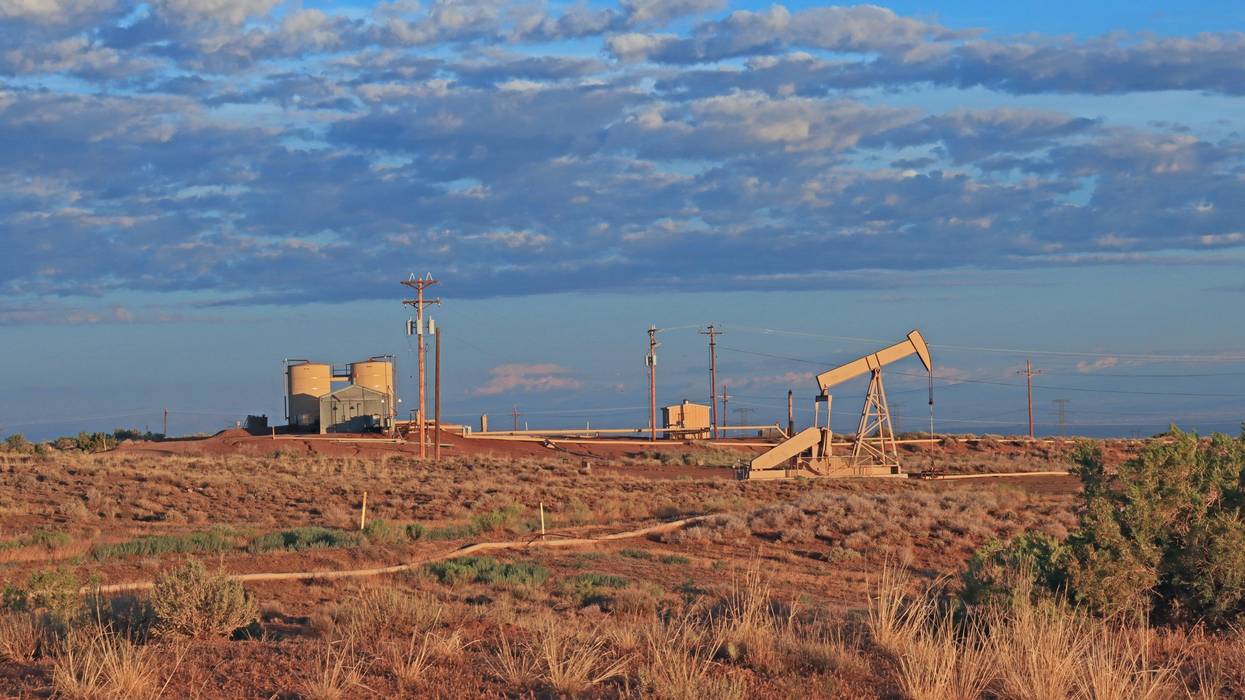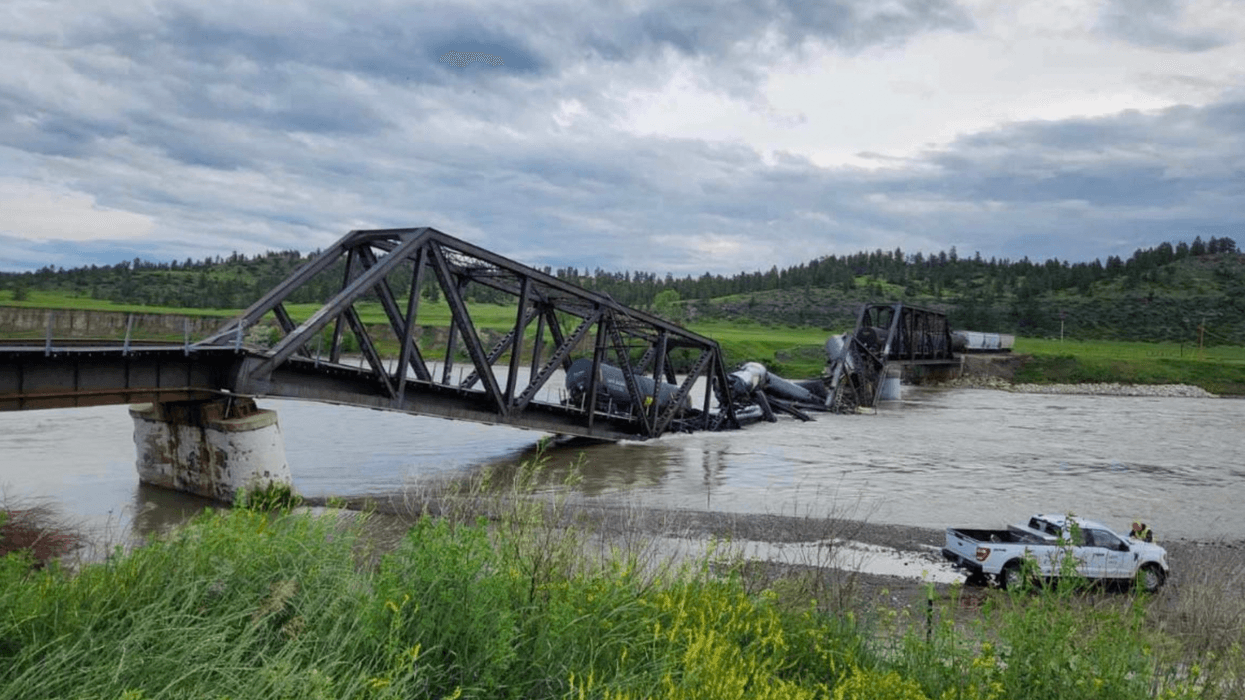'Devastating Loss for Our Wild Places': Supreme Court Attacks Bedrock Environmental Law
"The Trump administration will treat this decision as an invitation to ignore environmental concerns as it tries to promote fossil fuels, kill off renewable energy, and destroy sensible pollution regulations."
In a 8-0 ruling on Thursday, the U.S. Supreme Court not only reversed a block on a proposed oil train in Utah but also narrowed a landmark federal environmental law, sparking intense alarm about what the ruling will mean for communities and all living things across the country.
"Today's decision undermines decades of legal precedent that told federal agencies to look before they leap when approving projects that could harm communities and the environment," said Earthjustice senior vice president of program Sam Sankar in a statement. "The Trump administration will treat this decision as an invitation to ignore environmental concerns as it tries to promote fossil fuels, kill off renewable energy, and destroy sensible pollution regulations."
Since the National Environmental Policy Act (NEPA) was signed into law in 1970 by Republican then-President Richard Nixon, it has become a key target for GOP policymakers aligned with the planet-wrecking fossil fuel industry, including President Donald Trump, who swiftly took aim at the law after returning to office in January.
"We urgently need to strengthen laws like NEPA, not weaken or narrow them, so that we can prioritize the health of people over polluters and corporate greed."
NEPA requires federal agencies to prepare an environmental impact statement (EIS) for certain infrastructure projects. In 2023, the U.S. Court of Appeals for the District of Columbia Circuit tossed both an EIS for the proposed Uinta Basin Railway and the U. S. Surface Transportation Board's approval of the project, which would connect Utah's oil fields to the national rail network.
After hearing arguments for Seven County Infrastructure Coalition v. Eagle County in December, the nation's highest court reversed that decision on Thursday, continuing a trend of rulings slammed by environmentalists as gifts to corporate polluters.
Conservative Justice Neil Gorsuch recused himself without explanation. Politico noted that "it followed a public pressure campaign from environmental groups and Democrats who argued his close connections to the owner of oil and gas producer Anschutz—which filed a brief in the case saying NEPA's scope was critical to developing oil and gas reserves—disqualified him."
Justice Brett Kavanagh delivered the opinion, joined by the other right-wingers who participated in the case. Justice Sonia Sotomayor filed a concurring opinion, joined by the other two liberals.
Kavanaugh wrote for the majority that "the D. C. Circuit failed to afford the board the substantial judicial deference required in NEPA cases and incorrectly interpreted NEPA to require the board to consider the environmental effects of upstream and downstream projects that are separate in time or place from the Uinta Basin Railway."
Sotomayor, joined by Kagan and Jackson, refuses to join Kavanaugh's majority opinion, saying it "unnecessarily" grounds its analysis "largely in matters of policy." (It's clear that Kavanaugh wants to weaken NEPA's restrictions on energy permitting.) www.supremecourt.gov/opinions/24p...
[image or embed]
— Mark Joseph Stern (@mjsdc.bsky.social) May 29, 2025 at 10:09 AM
Environmental and public health advocates were quick to warn of the impacts of not only this 88-mile rail project, if completed, but also the decision more broadly.
"This decision is terrible news for the entire Colorado River Basin," said John Weisheit, conservation director at Living Rivers. "To avoid the pending collapse of the Colorado River, we have to immediately reduce water consumption by 25% and cut carbon emissions by 50% by the end of this decade. Our federal decision-makers must deny any project that counters these objectives. The Uinta Basin Railway unquestionably falls into that category and should never see the light of day."
Critics of the ruling are worried about increased oil extraction in Utah as well as additional refining in Gulf of Mexico communities.
"Regrettably, the Supreme Court has scored one for the oil companies who don't want you to look too closely at the harm their product will do to Black and Brown communities in Cancer Alley," said Sierra Club senior attorney Nathaniel Shoaff. "Our bedrock environmental laws, like NEPA, are meant to ensure people are protected from corporate polluters."
"Fossil fuel infrastructure projects do not exist in a vacuum and have far-reaching impacts on communities, especially those on the frontlines of climate change or those who face serious health harms from increased pollution," Shoaff stressed.
"The last thing we need is another climate bomb on wheels that the communities along its proposed route say they don't want."
Center for Biological Diversity senior attorney Wendy Park declared that "the last thing we need is another climate bomb on wheels that the communities along its proposed route say they don't want," and vowed to "keep fighting to make sure this railway is never built."
Park also looked beyond the train project, warning that "this disastrous decision to undermine our nation's bedrock environmental law means our air and water will be more polluted, the climate and extinction crises will intensify, and people will be less healthy."
WildEarth Guardians staff attorney Katherine Merlin similarly emphasized that "today's decision is a devastating loss for our wild places, our wild rivers, and for all of the human and nonhuman communities that depend on a clean environment and stable climate."
The ruling comes as the Trump administration and congressional Republicans are working to boost planet-heating fossil fuels, ignoring scientists' warnings about the worsening climate emergency.
"After the hottest year on record, when the U.S. should be improving environmental safeguards and empowering frontline communities, this decision is a giant step backwards," said Ashfaq Khalfan, Oxfam America's director of climate justice. "Everyone deserves to live and work in communities with clean air and safe drinking water. We urgently need to strengthen laws like NEPA, not weaken or narrow them, so that we can prioritize the health of people over polluters and corporate greed."


